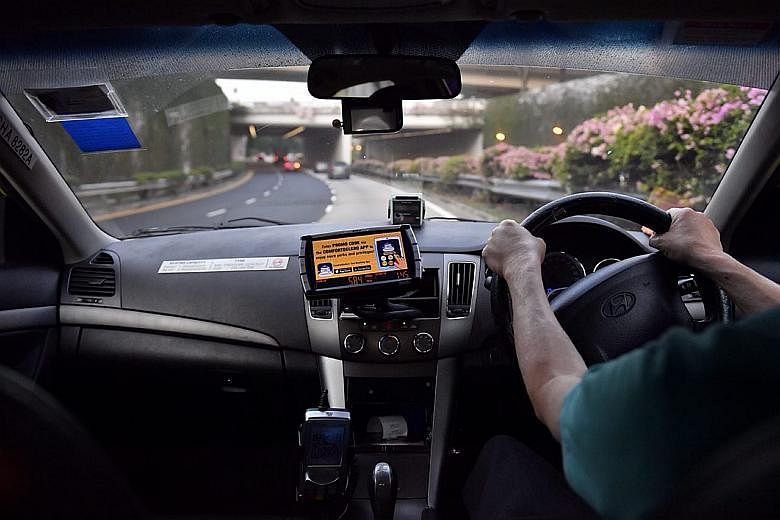SINGAPORE - Taxi and private-hire car drivers scored a victory against fare cheats and abusive passengers with the roll-out of new rules that allow drivers to insist on the use of inward-facing video cameras.
The new rules, which kicked in on Monday (April 9), clarify the use of such cameras against the backdrop of privacy laws.
Passengers who do not want to be recorded can choose not to use the transport service, said Singapore's privacy watchdog, the Personal Data Protection Commission, in its new advisory guidelines on in-vehicle recording by transport service providers.
The National Taxi Association had been lobbying for the use of inward-facing video cameras in taxis since 2015 to tackle unruly passengers and fare evaders.
Said the association's executive adviser, labour MP Ang Hin Kee: "The cameras will provide a greater sense of security, especially for female drivers, and help resolve disputes."
Mr Ang holds the same position with the National Private Hire Vehicles Association, which represents the interests of Uber and Grab drivers.
While there has been no rule against the use of inward-facing cameras in private-hire vehicles and cabs, privacy laws have created some uncertainty.
The image or voice of a person constitutes personal data, and in 2016, the privacy watchdog started a series of closed-door consultations with taxi and private-hire driver associations, the Vehicle Rental Association, and taxi and car rental companies to address the use of such data.
After several months, the privacy watchdog, working closely with the Land Transport Authority (LTA), developed the guidelines.
LTA assured consumers that taxi and private-hire car drivers need to seek its approval before installing these inward-facing cameras. LTA requires safeguards to be in place. Transport service companies and drivers must also abide by the Personal Data Protection Act (PDPA), fully in force since July 2, 2014.
For instance, transport service providers must put in place adequate security measures to protect consumers' personal data, or risk fines of up to $1 million under the PDPA.
The new advisories also require transport service providers to display a prominent notice about the use of inward-facing video cameras.
Drivers are not allowed to upload such videos on social media, but the videos can be used to assist in official investigations.
Passengers can request to view or to be given such recordings. The cost is borne by the transport company but if the company deems it too expensive to retrieve the recording, it can refuse the request.
Transport service providers must also put in place adequate security measures to protect consumers' personal data, or risk fines of up to $1 million under the PDPA.
While commuters understand that drivers need protection - the Public Transport Council had said there were 240 cases of fare evasion in 2015, up from 68 in 2012 - some are worried about privacy intrusion.
Teacher Jerena Tan, 30, said: "What if the driver takes videos of children or women and use the recording privately? How do we guard against that?"
Online bookstore owner Jiang Meiru, 36, agrees. "I nurse my baby in the cab. Although I use a nursing cover, I will still feel uncomfortable with a camera."
Privacy advocate and engineer Ngiam Shih Tung, 51, said there must be rules that govern access to the videos. "In the past, only one driver could see you. But now, there could be thousands of eyes," he said.
ComfortDelGro had in 2013 installed inward-facing cameras in the mobile data terminals in its taxis, but has since removed all the cameras.
Said spokesman Ms Tammy Tan: "We are currently reviewing the new guidelines and will work with our drivers to best look after their interests."
Mr Andrew Chan, head of GrabCar Singapore, welcomed the new guidelines. "(They) could also pave the way for new policy development to better protect the welfare of all our driver-partners and passengers, such as reducing instances of fare evasions."


